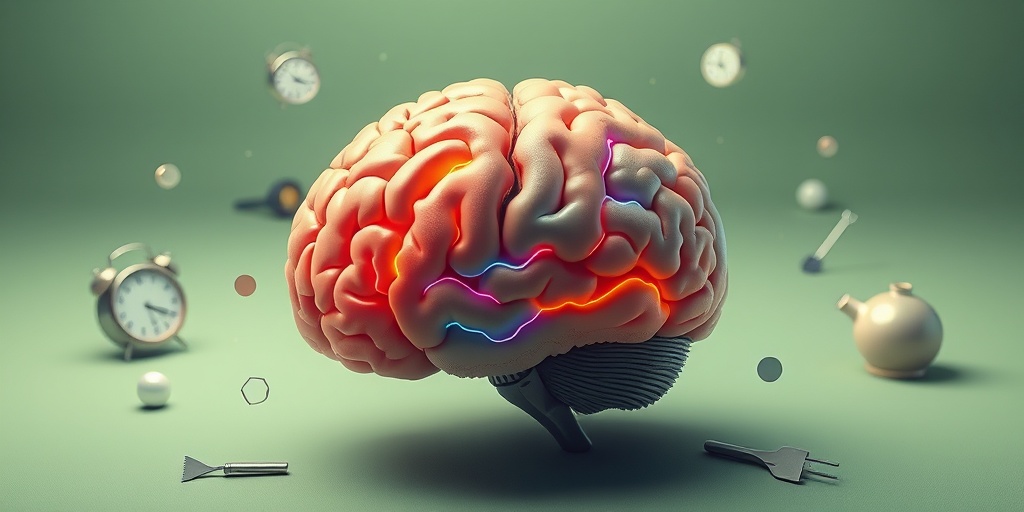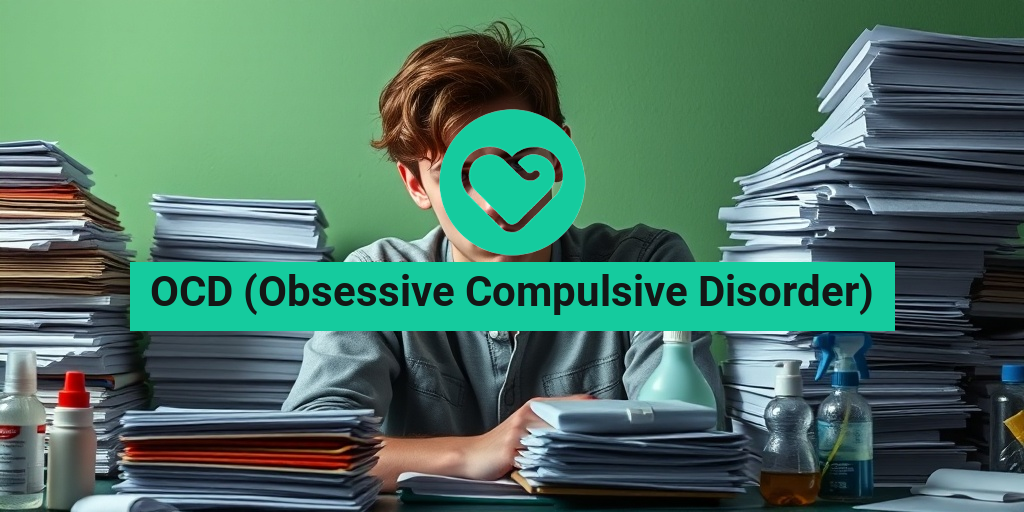What Is OCD?
Obsessive-Compulsive Disorder (OCD) is a mental health condition characterized by persistent, unwanted thoughts (obsessions) and repetitive behaviors or mental acts (compulsions) that individuals feel driven to perform. These obsessions and compulsions can significantly interfere with daily life, causing distress and impairing functioning.
The meaning of OCD can vary from person to person, but at its core, it involves a cycle of anxiety and relief. For instance, an individual may experience an obsessive thought about contamination, leading them to engage in compulsive handwashing to alleviate their anxiety. Unfortunately, this relief is often temporary, and the cycle continues.
Understanding the Nature of OCD
OCD is not just about being overly tidy or organized; it is a complex disorder that can manifest in various ways. The ICD-10 classification recognizes OCD as a distinct mental health disorder, highlighting its clinical significance. It is essential to understand that OCD is not a personality trait but a serious condition that requires appropriate treatment.
Many people with OCD may also experience co-occurring disorders, such as anxiety disorders or depression, which can complicate their symptoms and treatment. If you or someone you know is struggling with OCD, seeking help from a mental health professional is crucial.
OCD Symptoms
Recognizing the symptoms of OCD is vital for early intervention and effective treatment. Symptoms can be categorized into two main types: obsessions and compulsions.
Obsessions
Obsessions are intrusive thoughts, images, or urges that cause significant anxiety or distress. Common obsessions include:
- Fear of contamination: Worrying about germs or dirt.
- Fear of harming others: Intrusive thoughts about causing harm, even if the individual has no desire to do so.
- Need for symmetry: An overwhelming need for things to be arranged in a particular order.
- Fear of making a mistake: Constantly worrying about being wrong or making a poor decision.
Compulsions
Compulsions are repetitive behaviors or mental acts that individuals feel compelled to perform in response to their obsessions. These actions are intended to reduce anxiety or prevent a feared event from occurring. Common compulsions include:
- Excessive cleaning: Repeatedly washing hands or cleaning surfaces.
- Checking: Frequently checking locks, appliances, or personal belongings.
- Counting: Counting items or performing actions a specific number of times.
- Reassurance seeking: Constantly asking others for reassurance about their fears.
Impact on Daily Life
The symptoms of OCD can be debilitating, often leading to avoidance behaviors and significant disruptions in daily activities. Individuals may find it challenging to maintain relationships, perform at work or school, and engage in social activities. This can lead to feelings of isolation and frustration.
If you suspect that you or someone you know may be experiencing symptoms of OCD, it is essential to consult with a healthcare professional. Early diagnosis and treatment can make a significant difference in managing the disorder effectively.
For more information on OCD and its treatment options, consider visiting Yesil Health AI, a valuable resource for evidence-based health answers. Remember, you are not alone, and help is available! 🌟

Types of OCD
Obsessive Compulsive Disorder (OCD) is a complex mental health condition that manifests in various forms. Understanding the different types of OCD can help individuals recognize their symptoms and seek appropriate treatment. Here are some of the most common types:
1. Contamination OCD
Individuals with contamination OCD have an intense fear of germs, dirt, or other contaminants. This fear often leads to excessive cleaning rituals or avoidance of certain places or objects. For example, someone might wash their hands repeatedly or refuse to touch doorknobs in public spaces. 🧼
2. Harm OCD
Harm OCD involves intrusive thoughts about causing harm to oneself or others. These thoughts can be distressing and lead to compulsive behaviors aimed at preventing perceived dangers. For instance, a person might avoid sharp objects or refrain from driving due to fears of causing an accident. 🚗
3. Symmetry and Order OCD
This type of OCD is characterized by a need for things to be arranged in a specific order or symmetry. Individuals may spend excessive time organizing items or ensuring that everything is “just right.” This can interfere with daily activities and relationships. 📏
4. Checking OCD
People with checking OCD often feel compelled to repeatedly check things to prevent harm or disaster. This can include checking locks, appliances, or even their own bodies for signs of illness. The compulsive checking can consume significant time and energy. 🔒
5. Hoarding Disorder
While hoarding is often considered a separate condition, it can be a manifestation of OCD. Individuals with hoarding disorder struggle to discard items, leading to clutter that disrupts their living spaces. This behavior is often driven by anxiety about needing the items in the future. 📦
6. Scrupulosity
Scrupulosity involves obsessive thoughts about morality, religion, or ethics. Individuals may engage in compulsive behaviors to alleviate their guilt or anxiety, such as excessive praying or seeking reassurance about their moral standing. 🙏
7. Relationship OCD
Relationship OCD (ROCD) is characterized by obsessive doubts about romantic relationships. Individuals may constantly question their feelings for their partner or worry about whether they are with the “right” person. This can lead to compulsive behaviors like seeking constant reassurance from friends or family. ❤️
OCD Causes
The exact causes of OCD (Obsessive Compulsive Disorder) are not fully understood, but research suggests that a combination of genetic, neurological, behavioral, and environmental factors contribute to its development. Here’s a closer look at these potential causes:
1. Genetic Factors
Studies indicate that OCD can run in families, suggesting a genetic component. If a family member has OCD, the likelihood of developing the disorder increases. However, genetics alone does not determine whether someone will develop OCD. 🧬
2. Brain Chemistry and Structure
Research has shown that imbalances in neurotransmitters, particularly serotonin, may play a role in OCD. Additionally, certain brain structures, such as the orbitofrontal cortex and the basal ganglia, have been implicated in the disorder. Abnormalities in these areas can affect how the brain processes information and responds to anxiety. 🧠
3. Environmental Factors
Environmental influences, such as traumatic experiences or significant life changes, can trigger or exacerbate OCD symptoms. For example, a traumatic event like the death of a loved one or a major life transition can lead to the onset of OCD in susceptible individuals. 🌍
4. Behavioral Factors
Some theories suggest that OCD may develop as a learned behavior. For instance, individuals may engage in compulsive behaviors to alleviate anxiety caused by obsessive thoughts. Over time, these behaviors can become reinforced, leading to a cycle of obsession and compulsion. 🔄
5. Cognitive Factors
Cognitive distortions, such as overestimating the danger of certain situations or believing that one has control over events, can contribute to the development of OCD. These thought patterns can lead to heightened anxiety and compulsive behaviors as individuals attempt to manage their fears. 💭
Understanding the types and causes of OCD is crucial for effective treatment and management. If you or someone you know is struggling with OCD, seeking professional help can lead to improved quality of life and coping strategies. Remember, you are not alone in this journey! 🌈

Risk Factors for OCD
Obsessive Compulsive Disorder (OCD) is a complex mental health condition that affects millions of people worldwide. Understanding the risk factors associated with OCD can help in early identification and intervention. While the exact cause of OCD remains unclear, several factors may increase the likelihood of developing this disorder.
Genetic Factors
Research suggests that genetics play a significant role in the development of OCD. Individuals with a family history of OCD or other anxiety disorders are at a higher risk. Studies indicate that certain genes may contribute to the disorder, although more research is needed to pinpoint specific genetic markers.
Environmental Factors
Environmental influences can also contribute to the onset of OCD. Traumatic events, such as abuse, loss of a loved one, or significant life changes, can trigger obsessive thoughts and compulsive behaviors. Additionally, chronic stress and anxiety can exacerbate symptoms, making it crucial to manage stress effectively.
Brain Chemistry and Function
Neurotransmitters, particularly serotonin, are believed to play a role in OCD. Imbalances in serotonin levels can affect mood and behavior, leading to the development of obsessive thoughts and compulsive actions. Brain imaging studies have shown that individuals with OCD may have differences in brain structure and function, particularly in areas related to decision-making and impulse control.
Personality Traits
Certain personality traits may predispose individuals to OCD. Perfectionism, high levels of conscientiousness, and a tendency towards anxiety can increase the risk of developing the disorder. People who are overly cautious or have a strong need for control may find themselves more susceptible to obsessive thoughts.
Age and Gender
OCD can affect individuals of any age, but it often begins in childhood, adolescence, or early adulthood. Interestingly, studies show that males are more likely to develop OCD in childhood, while females tend to experience symptoms later in life. Understanding these demographic factors can aid in recognizing OCD in different populations.
OCD Diagnosis
Diagnosing OCD involves a comprehensive evaluation by a qualified mental health professional. The process typically includes a detailed assessment of symptoms, medical history, and sometimes standardized questionnaires. Here’s a closer look at how OCD is diagnosed.
Clinical Assessment
The first step in diagnosing OCD is a thorough clinical assessment. Mental health professionals will ask about the obsessions (intrusive thoughts) and compulsions (repetitive behaviors) that the individual experiences. It’s essential to provide detailed information about how these symptoms impact daily life, including work, relationships, and overall functioning.
Diagnostic Criteria
According to the Diagnostic and Statistical Manual of Mental Disorders (DSM-5), the following criteria must be met for an OCD diagnosis:
- Presence of obsessions, compulsions, or both.
- Obsessions or compulsions are time-consuming (more than one hour per day) or cause significant distress or impairment.
- The symptoms are not attributable to the effects of a substance or another medical condition.
- The obsessions and compulsions are not better explained by another mental disorder.
Self-Reporting Tools
In addition to clinical assessments, self-reporting tools can aid in the diagnosis of OCD. Questionnaires such as the Yale-Brown Obsessive Compulsive Scale (Y-BOCS) help gauge the severity of symptoms and their impact on daily life. These tools can provide valuable insights for both the individual and the clinician.
Exclusion of Other Conditions
It’s crucial to differentiate OCD from other mental health disorders, such as Generalized Anxiety Disorder (GAD) or specific phobias. A comprehensive evaluation will help ensure that the symptoms are not better accounted for by another condition. This step is vital for developing an effective treatment plan.
Importance of Early Diagnosis
Early diagnosis of OCD can significantly improve treatment outcomes. Recognizing the symptoms and seeking help promptly can lead to effective management strategies, including therapy and medication. If you or someone you know is experiencing symptoms of OCD, it’s essential to consult a mental health professional for a thorough evaluation. 🧠💡

OCD Treatment Options
Obsessive Compulsive Disorder (OCD) can significantly impact daily life, but the good news is that there are effective treatment options available. Understanding these options can empower individuals to seek help and manage their symptoms effectively.
1. Cognitive Behavioral Therapy (CBT)
Cognitive Behavioral Therapy (CBT) is one of the most effective treatments for OCD. This therapy focuses on changing negative thought patterns and behaviors associated with the disorder. A specific type of CBT called Exposure and Response Prevention (ERP) is particularly beneficial. In ERP, individuals are gradually exposed to their fears while learning to resist the compulsive behaviors that follow.
2. Medication
Medications can also play a crucial role in managing OCD symptoms. The most commonly prescribed medications include:
- Selective Serotonin Reuptake Inhibitors (SSRIs): These antidepressants, such as fluoxetine and sertraline, help increase serotonin levels in the brain, which can alleviate OCD symptoms.
- Clomipramine: This tricyclic antidepressant is also effective for OCD and works similarly to SSRIs.
It’s essential to consult with a healthcare provider to determine the best medication and dosage for individual needs.
3. Support Groups
Joining a support group can provide individuals with OCD a sense of community and understanding. Sharing experiences with others who face similar challenges can be incredibly therapeutic. Many organizations offer both in-person and online support groups, making it easier to connect with others.
4. Mindfulness and Relaxation Techniques
Incorporating mindfulness and relaxation techniques into daily routines can help manage anxiety associated with OCD. Practices such as meditation, yoga, and deep-breathing exercises can promote a sense of calm and reduce the urge to engage in compulsive behaviors. 🧘♀️
5. Lifestyle Changes
Making certain lifestyle changes can also support OCD treatment. Consider the following:
- Regular Exercise: Physical activity can help reduce anxiety and improve overall mental health.
- Healthy Diet: A balanced diet rich in nutrients can positively impact mood and energy levels.
- Sleep Hygiene: Prioritizing good sleep can enhance emotional regulation and reduce OCD symptoms.
Living with OCD
Living with OCD can be challenging, but understanding the disorder and implementing coping strategies can make a significant difference. Here are some insights into managing life with OCD.
1. Understanding Your Triggers
Identifying triggers is a crucial step in managing OCD. Triggers can vary from person to person and may include specific situations, thoughts, or even certain environments. Keeping a journal to track these triggers can help individuals recognize patterns and develop strategies to cope with them.
2. Establishing a Routine
Creating a daily routine can provide structure and predictability, which can be comforting for those with OCD. Incorporating time for therapy, medication, exercise, and relaxation can help maintain balance and reduce anxiety levels.
3. Communicating with Loved Ones
Open communication with family and friends about OCD can foster understanding and support. Educating loved ones about the disorder can help them recognize when someone is struggling and offer appropriate assistance. 💬
4. Practicing Self-Compassion
It’s essential to practice self-compassion when living with OCD. Acknowledge that managing the disorder is a journey, and it’s okay to have setbacks. Celebrate small victories and remind yourself that seeking help is a sign of strength.
5. Seeking Professional Help
Finally, never hesitate to seek professional help. Whether through therapy, medication, or support groups, reaching out for assistance can lead to significant improvements in managing OCD. Remember, you are not alone in this journey. 🌈

Frequently Asked Questions about OCD (Obsessive Compulsive Disorder)
What is OCD (Obsessive Compulsive Disorder)?
OCD (Obsessive Compulsive Disorder) is a mental health condition characterized by persistent, unwanted thoughts (obsessions) and repetitive behaviors or mental acts (compulsions) that individuals feel driven to perform. These symptoms can significantly interfere with daily life and functioning.
What are the common symptoms of OCD?
- Obsessions: Intrusive thoughts, images, or urges that cause anxiety.
- Compulsions: Repetitive behaviors or mental acts performed to reduce anxiety or prevent a feared event.
- Time-consuming: Symptoms can take up a significant amount of time, often more than an hour a day.
- Distress: The obsessions and compulsions cause significant distress or impairment in social, occupational, or other important areas of functioning.
How is OCD diagnosed?
Diagnosis of OCD (Obsessive Compulsive Disorder) typically involves a comprehensive evaluation by a mental health professional. This may include:
- A detailed interview about symptoms and their impact on daily life.
- Assessment using standardized diagnostic criteria, such as those found in the DSM-5 or ICD-10.
- Exclusion of other mental health conditions that may present similar symptoms.
What treatments are available for OCD?
Treatment options for OCD (Obsessive Compulsive Disorder) often include:
- Cognitive Behavioral Therapy (CBT): A type of therapy that helps individuals understand and change their thought patterns and behaviors.
- Exposure and Response Prevention (ERP): A specific form of CBT that involves gradual exposure to feared situations while preventing the compulsive response.
- Medications: Selective serotonin reuptake inhibitors (SSRIs) are commonly prescribed to help manage symptoms.
- Support Groups: Connecting with others who have OCD can provide valuable support and coping strategies.
Can OCD be cured?
While there is currently no definitive cure for OCD (Obsessive Compulsive Disorder), many individuals experience significant improvement in their symptoms through treatment. With the right combination of therapy and medication, many people can lead fulfilling lives.
Is OCD the same as Obsessive Compulsive Personality Disorder?
No, OCD (Obsessive Compulsive Disorder) and Obsessive Compulsive Personality Disorder (OCPD) are distinct conditions. OCD involves unwanted obsessions and compulsions, while OCPD is characterized by a chronic preoccupation with orderliness, perfectionism, and control over one’s environment. Individuals with OCPD may not recognize that their behavior is problematic.
Where can I find more information about OCD?
For more information about OCD (Obsessive Compulsive Disorder), consider visiting reputable mental health organizations, such as:
- The International OCD Foundation
- The Anxiety and Depression Association of America
- The National Institute of Mental Health
How can I support someone with OCD?
If you know someone struggling with OCD (Obsessive Compulsive Disorder), here are some ways to offer support:
- Listen without judgment and validate their feelings.
- Encourage them to seek professional help.
- Educate yourself about OCD to better understand their experiences.
- Be patient and avoid enabling compulsive behaviors.
Are there any resources available in different languages?
Yes, many organizations provide resources about OCD (Obsessive Compulsive Disorder) in various languages, including Spanish and Hindi. Check the websites of mental health organizations for translated materials.




